Key takeaways:
- Mock interviews provide a safe space for practicing responses and receiving constructive feedback, enhancing confidence and reducing anxiety.
- Different formats, such as one-on-one, panel, and group interviews, each present unique challenges and help develop adaptability and teamwork skills.
- Preparation is key—researching the company, practicing common questions, and seeking feedback after the simulation improve overall performance.
- Authenticity, effective body language, and storytelling significantly impact how candidates connect with interviewers and convey their experiences.
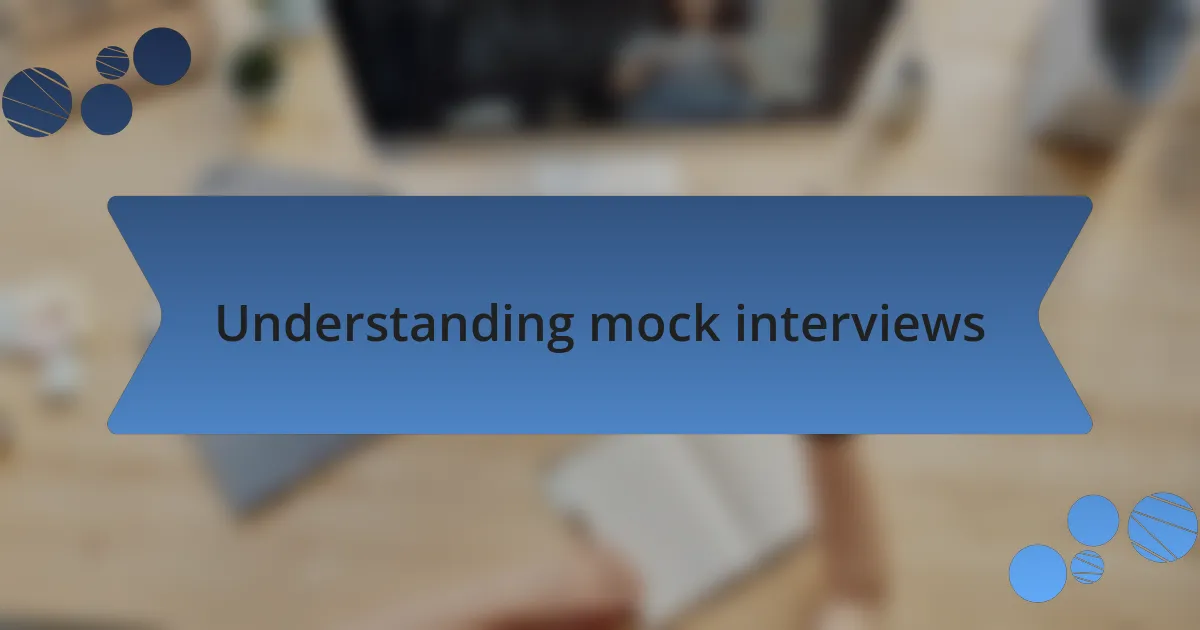
Understanding mock interviews
Mock interviews serve as a valuable rehearsal for real job interviews, allowing students to practice their responses and reduce anxiety. When I participated in my first mock interview, the nerves were palpable. But by the end, I felt a huge sense of relief, realizing that facing a panel—even in a simulated environment—was much less daunting than I had imagined.
These practice sessions offer not just a chance to refine your answers but also critical feedback from peers or mentors. I remember receiving constructive criticism on my body language and tone; it was eye-opening. Have you ever thought about how much non-verbal communication impacts your message? It’s fascinating to me how little adjustments in posture or eye contact can make a significant difference in how you’re perceived.
Moreover, mock interviews simulate unpredictable aspects of the real thing, such as tough questions or unexpected formats. One time, I was thrown a curveball about a weakness I was working on, and while I felt blindsided, it taught me the importance of preparation for any scenario. Isn’t it intriguing how these experiences can transform our outlook on real interviews? They help you build resilience and boost your confidence, making you more equipped for the actual encounter.
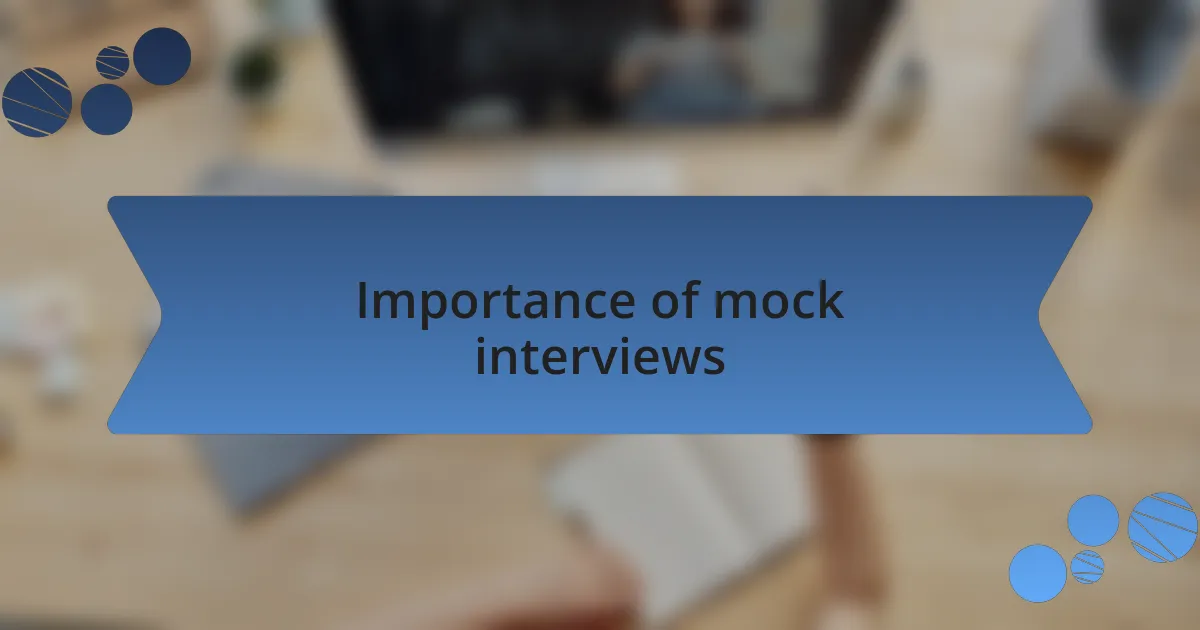
Importance of mock interviews
Engaging in mock interviews is crucial for students as they create a risk-free environment to practice essential interviewing skills. I remember the first time I faced a panel of experienced professionals, and the pressure was palpable. That practice run taught me the importance of staying calm under pressure.
The feedback I received during those sessions was invaluable. For instance, after one mock interview, a mentor pointed out that my answers were solid, but I needed to show more enthusiasm. Have you ever considered how your energy can influence an interviewer’s perception? That moment made me realize that genuine excitement about a position can make a significant positive impact.
Mock interviews also help in honing critical thinking and adaptability. One time, the interviewer posed a question that I hadn’t prepared for, and instead of stumbling, I learned to pause and think on my feet. That experience reinforced my belief that flexibility in responses is essential. Isn’t it fascinating how mock interviews can mirror real-life situations and prepare you for anything?
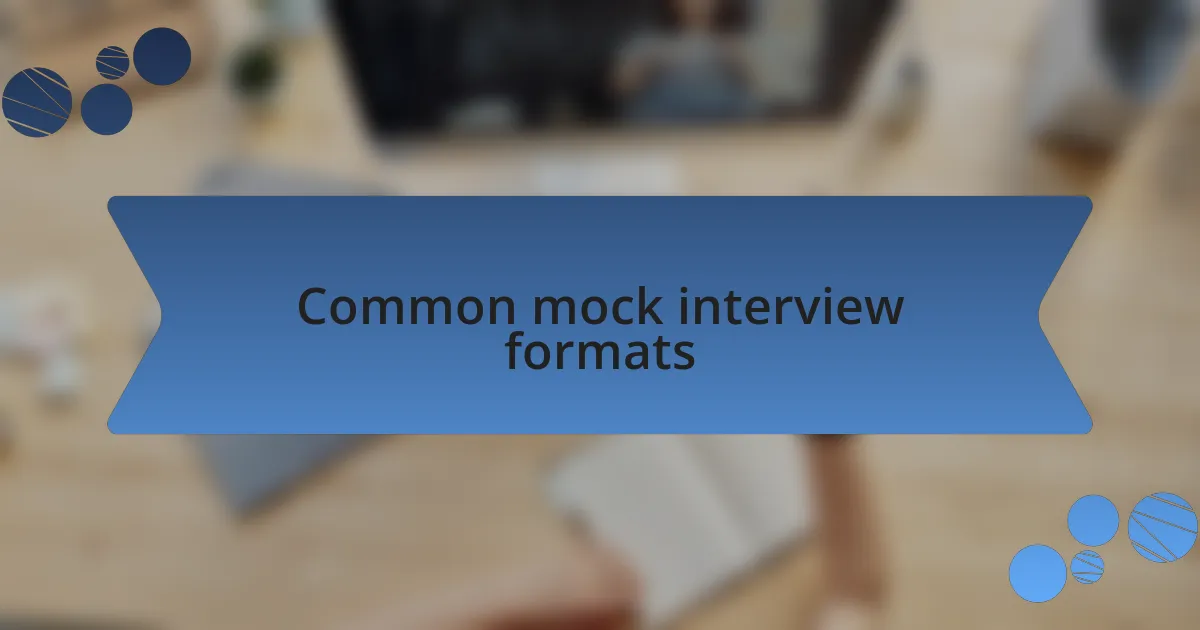
Common mock interview formats
When it comes to mock interviews, one common format is the one-on-one interview, where a single interviewer poses questions directly to the candidate. I distinctly remember my first experience with this format. It felt intimate yet nerve-wracking, as I sat across from someone seasoned in hiring. This setup really pushed me to articulate my thoughts clearly, understanding that my entire performance hinged on that direct interaction.
Another prevalent format is the panel interview, involving multiple interviewers from different departments. I vividly recall a session where I was bombarded with questions from varied perspectives—technical, behavioral, and situational. This format taught me the importance of engaging with each panelist, making eye contact, and adjusting my responses based on their non-verbal cues. Have you ever found it challenging to handle multiple questions at once? It highlighted my need for composure and adaptability.
Group mock interviews are also gaining traction. In one of these sessions, I had to collaborate with peers, answering questions while also assessing their responses. This format can be incredibly valuable as it simulates a team dynamic, requiring us to think critically and cooperatively under scrutiny. I realized how crucial it is to listen actively and contribute thoughtfully to ensure a cohesive conversation. How do you think teamwork plays a role in interviews? It’s a reminder that we’re often evaluated not just as individuals, but as potential team members.
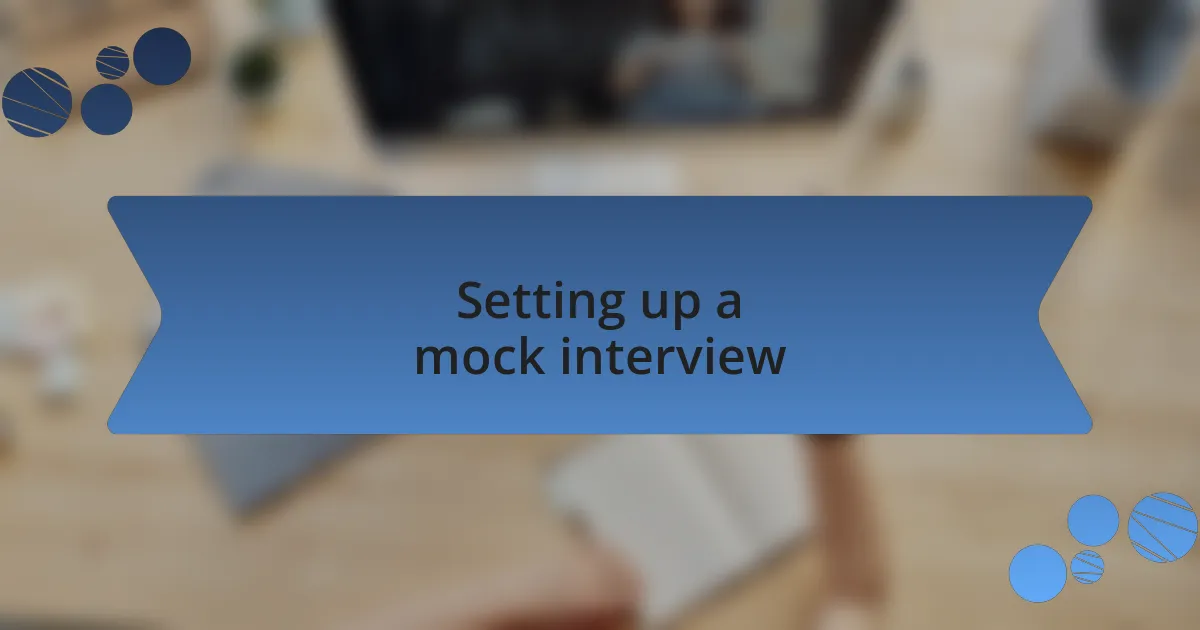
Setting up a mock interview
To set up a mock interview, it’s essential to create an environment similar to a real interview. I remember arranging my first mock interview in a quiet room, trying to mimic the formal atmosphere I expected in the job market. This detail is crucial—having the right setting helped increase my focus and seriousness about the exercise.
Next, choosing the right interviewer can significantly shape the experience. For my second mock interview, a mentor took the role, offering feedback that was both honest and constructive. Has anyone ever provided you insights that you found uncomfortable yet invaluable? I learned that confronting my weaknesses head-on was an integral part of my growth.
Finally, don’t forget to prepare a set of targeted questions beforehand. I made this mistake during one of my initial mock interviews, where I stumbled over inquiries, feeling unprepared. Crafting specific questions not only demonstrates your commitment to the process but also builds your confidence. How can you know where to improve if you don’t ask the right questions? It’s this proactive approach that ultimately enhances your performance.
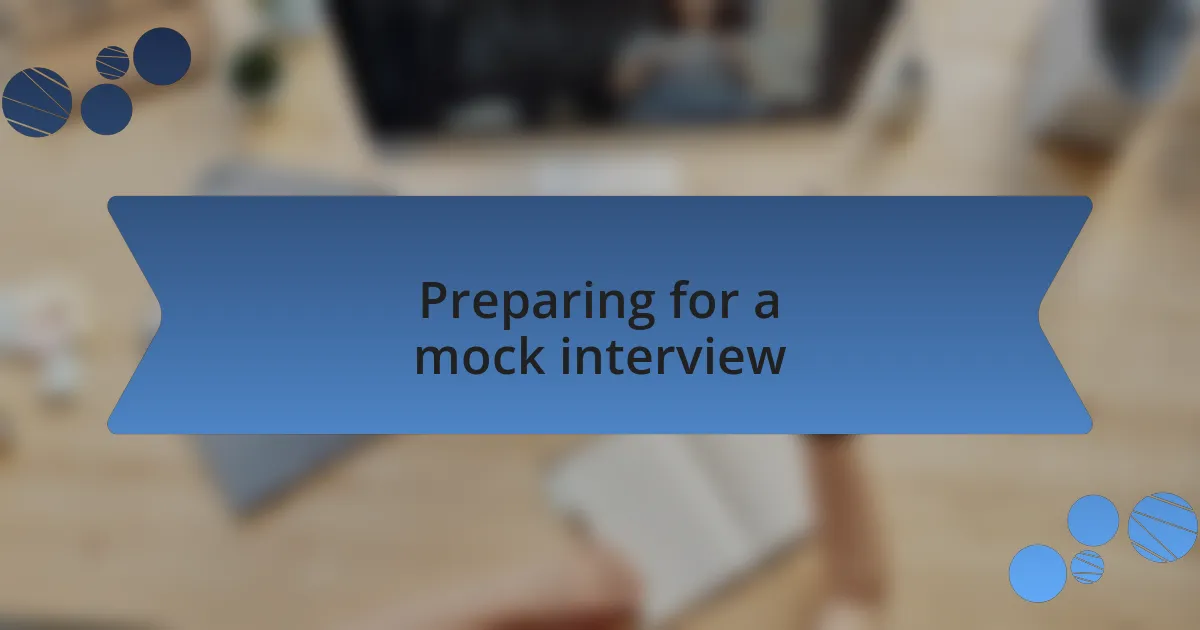
Preparing for a mock interview
When getting ready for a mock interview, I found that researching the company and role I was simulating made a huge difference. I remember one instance where I delved deep into a company’s values and recent projects. This preparation not only gave me confidence but also helped me answer questions in a way that mirrored their mission. Have you ever walked into an interview feeling totally unprepared? It’s nerve-wracking, but knowing the company inside and out can turn that anxiety into excitement.
Another key aspect is practicing common interview questions. I started jotting down questions that seemed to appear in every interview guide I came across. At first, my answers felt awkward and rehearsed, but with regular practice, I could convey my thoughts more naturally. It’s remarkable to see the transformation when you shift from thinking of answers to having a genuine conversation. How does it feel when you finally articulate your experience clearly? That clarity can elevate your performance immensely.
Lastly, I can’t stress enough the importance of receiving feedback after the mock interview. During my practice sessions, I made it a point to seek input not just on my answers but also on my body language and tone. This insight was sometimes hard to hear, but it led to significant improvements. Think about it—how can you grow if you don’t know what to work on? Embracing constructive criticism is a stepping stone to success, and I can’t imagine where I would be without it.
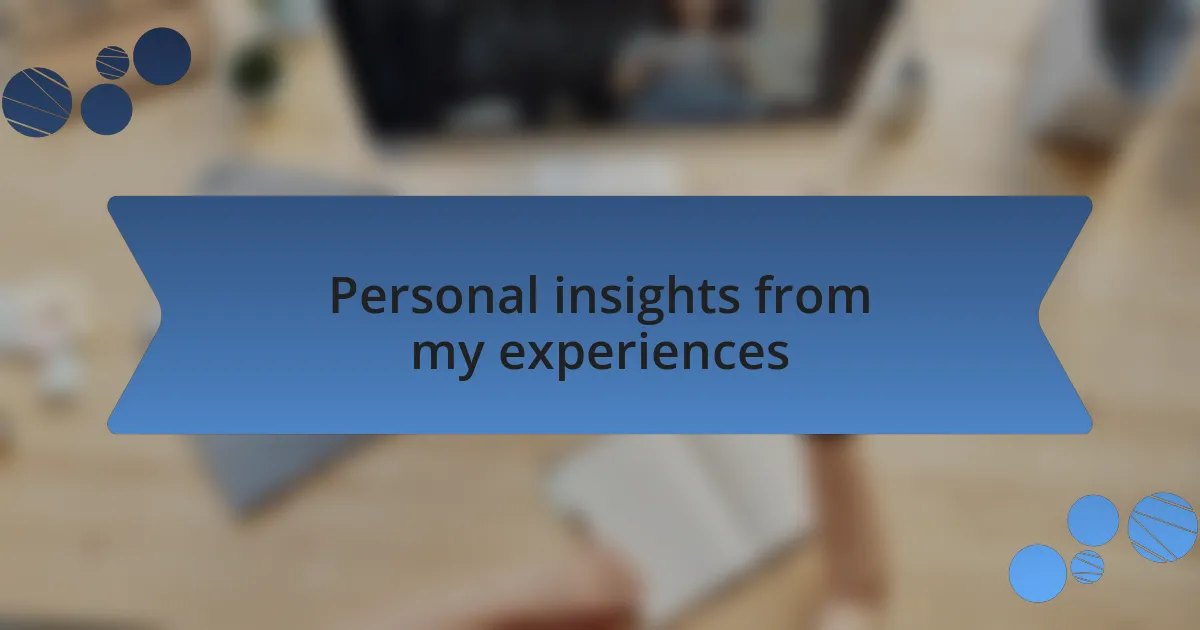
Personal insights from my experiences
While reflecting on my mock interview experiences, one powerful lesson emerged: it’s all about authenticity. I recall preparing for a simulation where I tried to fit into a mold of what I thought the interviewer wanted. It was exhausting and felt disingenuous. When I finally dropped the façade and shared personal stories that connected to the role, the conversation flowed so much better. Have you noticed how speaking from the heart can create a deeper connection?
Another insight is the role of body language. I vividly remember practicing my interviews in front of a mirror—at first, I was stiff and unsure, but gradually I became more aware of how my posture and gestures impacted my presence. There’s a certain energy that comes from being open and engaging. It’s interesting to think about how a subtle shift in how you present yourself can affect the interviewer’s perception. Do you ever feel like your nerves hold you back from showcasing your true self? I certainly did at first.
One of the most surprising takeaways from my mock interviews was the value of storytelling. I learned that weaving my experiences into narratives not only made my answers more relatable but also memorable. I can still think back to a time when I shared a failure that taught me resilience and the interviewer nodded in understanding. Isn’t it fascinating how sharing vulnerabilities can sometimes resonate more than polished successes? It’s a reminder that we’re all human, and building that rapport can be a game-changer.